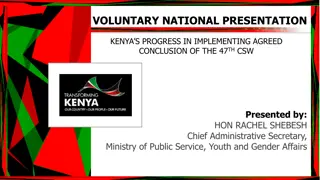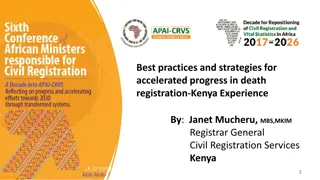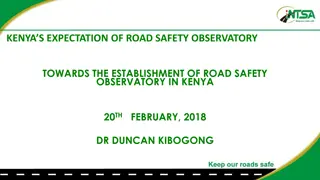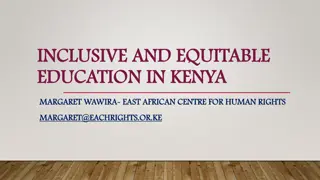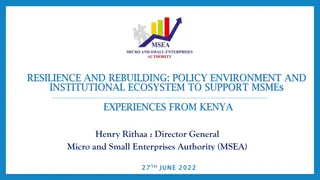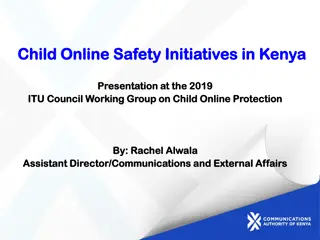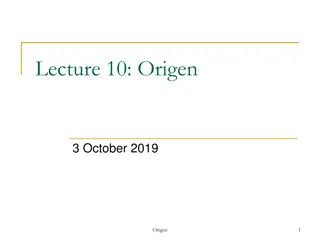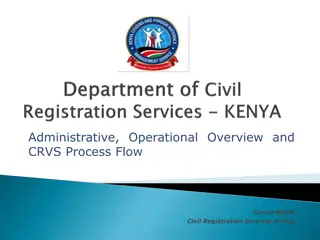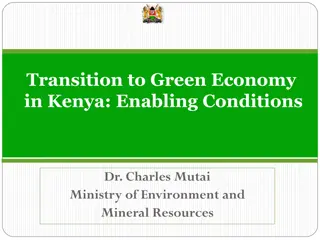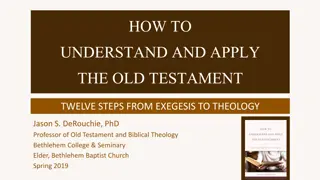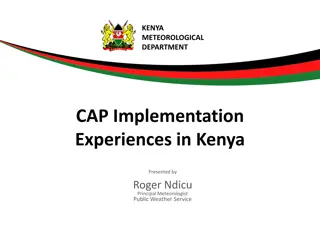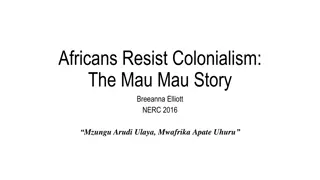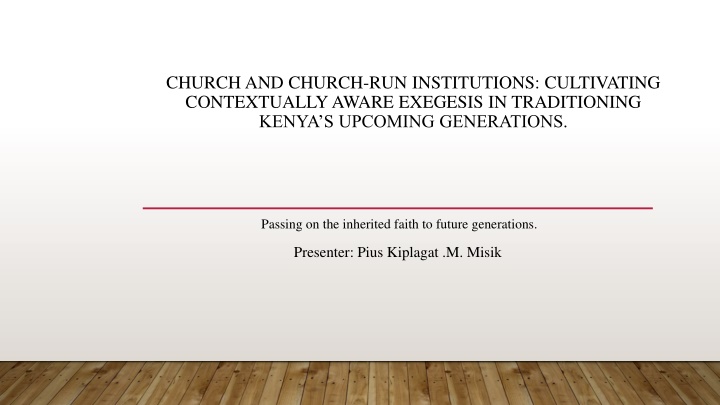
Cultivating Contextually Aware Exegesis in Traditioning Kenya's Upcoming Generations
Passing on the inherited faith to future generations through traditioning and contextual exegesis in Kenya, embracing indigenous cultural narratives and creating a dynamic ecclesial identity. Emphasizing the importance of cultural apologetics and Christian voice within the African context to make Africa's story whole.
Download Presentation

Please find below an Image/Link to download the presentation.
The content on the website is provided AS IS for your information and personal use only. It may not be sold, licensed, or shared on other websites without obtaining consent from the author. If you encounter any issues during the download, it is possible that the publisher has removed the file from their server.
You are allowed to download the files provided on this website for personal or commercial use, subject to the condition that they are used lawfully. All files are the property of their respective owners.
The content on the website is provided AS IS for your information and personal use only. It may not be sold, licensed, or shared on other websites without obtaining consent from the author.
E N D
Presentation Transcript
CHURCH AND CHURCH-RUN INSTITUTIONS: CULTIVATING CONTEXTUALLY AWARE EXEGESIS IN TRADITIONING KENYA S UPCOMING GENERATIONS. Passing on the inherited faith to future generations. Presenter: Pius Kiplagat .M. Misik
2: INTRODUCTION I John 1:1-3 .. Which we have seen ..looked and our hands touched- we proclaim to you Early missionaries established Bible schools, basic education schools, and churches- leadership development and literacy. Jewish Rabbinic schools, emphasized memorization through repetition. Missionary education - practical training, and literacy to enable Bible reading aimed at evangelism. Western interpretive frameworks dominated, often disregarding African contexts. Discipleship - Foreign resources & ritualistic methods - Initiation by borrowed paradigms Somebody else s story
SO WHAT? African question- What am I to do? The Ethiopian Eunuch Question- Do you understand what you are reading? How can I, unless someone guides me (Acts 8:30-31)? I can only answer the question, What am I to do? If I can answer the prior question, of what story or stories do I find myself apart? (Alasdair Mcintyre, 2013, p. 250). Enlightenment story- man s emergence from self-imposed immaturity . The ability to use one understanding without somebody else s guidance (Kant, I., 1996, pp.11-22). Morality is grounded in human reason and faith not the default option in our society.
CONTINUE Romantic story- Me first- is the common sense. Sin is failure to be true to yourself. So, the greatest commandment be yourself and second don t judge neighbors self-expression. Consumer story. We commoditize everything Gospel of prosperity (Health and wealth) The pluralist situation is above all a market situation. In it, the religious institutions become marketing agencies, and the religious traditions become consumer commodities (Peter Berger, 1967).
RE-ORIENTATION OF OUR STORYING Therefore, with such a convergence of stories and our reality. What will make Africa s story whole? How do they appropriate scripture as the grand story now and in the future? Cultural Apologetics through Contextual exegesis The work of establishing a Christian voice, conscience, and imagination within a culture so that Christianity is seen as true and satisfying ( Paul Gould, 2019).
3. TRADITIONING AND CONTEXTUAL EXEGESIS Traditioning: Passing down Christian faith across generations. Involves more than religious knowledge it's about creating a dynamic and living ecclesial identity (Mallon). Faith transmission should resonate with indigenous cultural narratives (Adamo 2001, Elizabeth Mburu, 2019).
4. CONTEXTUAL AWARE EXEGESIS What? Elizabeth Africa Hermeneutic, Others Contextual exegesis. But I added the word aware to bring in the aspect of proactive/ intentional consciousness. Reformed hermeneutics; Emphasizes a wrestling with the original message of the text, the intent of the biblical authors, the historical context, and the structural-textual considerations of the passage such as its genre, and literary devices (Matthew Kaemingk, 2021,p.57). But in Contextual Aware exegesis; Reformed hermeneutical reading and the Reader's textual context and cultural realities. So, the approach is sensitive to both the textual context and the reader's cultural realities. Churches and schools need this to make tradition and rites relevant to local experiences.
5. SIGNIFICANCE OF CONTEXTUALLY AWARE EXEGESIS IN THE PROCESS OF TRADITIONING Respond to enlightenment and consumerist perspective prevalent in modern worldviews and shaped world Christianity for decades Deal with dualism, split-loyalty and Syncretism: Enable engagement between scripture and African cultures, exposing false theologies and practices. Reconciling the Influence and Impact of Hybridity ( Bolger, et al 2009) : Recognizes and actualizes multidimensional/global character of Christian faith traditions. Provide avenues of Cultural integration, Dynamic Interpretation, Resistance and adaptation, Preservation and innovation. Cultivate fresh insights from the biblical texts and provide a different way of reading that complements Western and other readings- enhance relevant discipleship and traditioning. Equipping ordinary readers: It empowers ordinary readers to actively interpret the Bible, connecting Scriptural insights to local issues. Foster faith community future spiritual legacy.
6. TRADITIONING AND CULTURAL INTEGRATION. James R. Krabill et al. (2013) in Worship and Mission for the Global Church. Emphasize the importance of culturally appropriate arts in gospel witness, highlighting how they can enhance spiritual expression and witness. W. Jay Moon, in Africa Proverbs Reveal Christianity in Culture. Decries limited penetration of Scripture into African culture, as noted in Ghana Bulisa people's faith. Recommend use of indigenous symbols to create meaningful connections between Scripture and cultural contexts. Symbols can serve as "windows" for deeper engagement with scripture and foster a more integrated understanding of faith within cultural frameworks.
CONTINUED However, Mburu, Elizabeth W. 2019. African Hermeneutics, acknowledge that Interpretation of Scripture occurs within one's worldview and culture. 4-legged stool model- Parallels to the African Context (Traditional as Well as Modern), theological context, literary context, historical and cultural context. Contextual aware Exegesis: Re-modelled 4-legged stool to a 3- fire-place model.
7. CHALLENGES AND OPPORTUNITIES. The rise of Pentecostal-charismatic movements introduces new traditions (Parsitau et al, 2010) Churches face a dilemma between Western worship styles and local adaptations. Reconnecting with indigenous identity and incorporating local art forms is crucial for a transformative Christian faith (Krabil et al, 2013,199-205).
8. APPLICATION IN EDUCATION. Change Needed in School Religious Teaching: Enrich Western interpretive methodology and avoid the worldview behind the frameworks. Localize religious teaching but make sure its Biblically sound. Developing a Faith Heritage: Use a contextually relevant exegetical framework. Promote deepening discipleship. Establish a firm foundation for Christian traditions (Catholic, Anglican, Reformed) that is expressed in locally appropriate language, forms and idioms ( Krabill et al , 2013, Mburu, 2009) Role of Schools: Since faith is still central in education-Foster a living, dynamic, and transformative local connection.
10. APPLICATION IN THEOLOGICAL EDUCATION Foundational Exegetical theology- Source of Biblical theology which builds systematic theology and Practical theology (Walter Kaiser, C.1998). Ensure Africa s theology is firmly rooted in scripture and relevant. Create implications stemming from the text in a locally understandable way.
9. CONCLUSION: Traditioning through contextual exegesis ensures the faith remains scripturally rooted but culturally relevant. Aimed at creating a Christ-centered faith that addresses African life and experiences. Kenyan churches, Theological institutitons and schools are critical in shaping the next generation's identity.
BIBLIOGRAPHY Adamo, D.T., 2001. Reading and interpreting the Bible in African indigenous churches. Wipf and Stock Publishers. Berger, P.L.,1967. The Sacred Canopy: Elements of a Sociological Theory of Religion. Garden City, N.Y.:Doubleday. Gould, P.M., 2019. Cultural apologetics: Renewing the Christian voice, conscience, and imagination in a disenchanted world. Zondervan Academic. Kant, I., 1996. An answer to the question: What is enlightenment?(1784). Practical philosophy, pp.11-22. Krabill, J., Fortunato, F. and Harris, R.P. eds., 2013. Worship and Mission for the Global Church: An Ethnodoxolgy Handbook. William Carey Publishing. MacIntyre, A., 2013. After virtue. A&C Black. Mallon, Colleen Mary, OP. 2011. Traditioning Disciples: The Contributions of Cultural Anthropology to Ecclesial Identity. Eugene: Wipf and Stock Publishers. Mburu, E., 2019. African hermeneutics. Langham Publishing. Moon, W. Jay, 2009. African Proverbs Reveal Christianity in Culture: A Narrative Portrayal of Builsa Proverbs Contextualizing Christianity in Ghana, Eugene, Or: Pickwick Publications. Parsitau et al, 2010, God in the city: Pentecostalism as an urban Phenomenon in Kenya. Walter Kaiser, C., 1998. Toward an Exegetical Theology: Biblical Exegesis for Preaching and Teaching (Baker Books, 1998
10. THANK YOU: Thank you for the Opportunity




